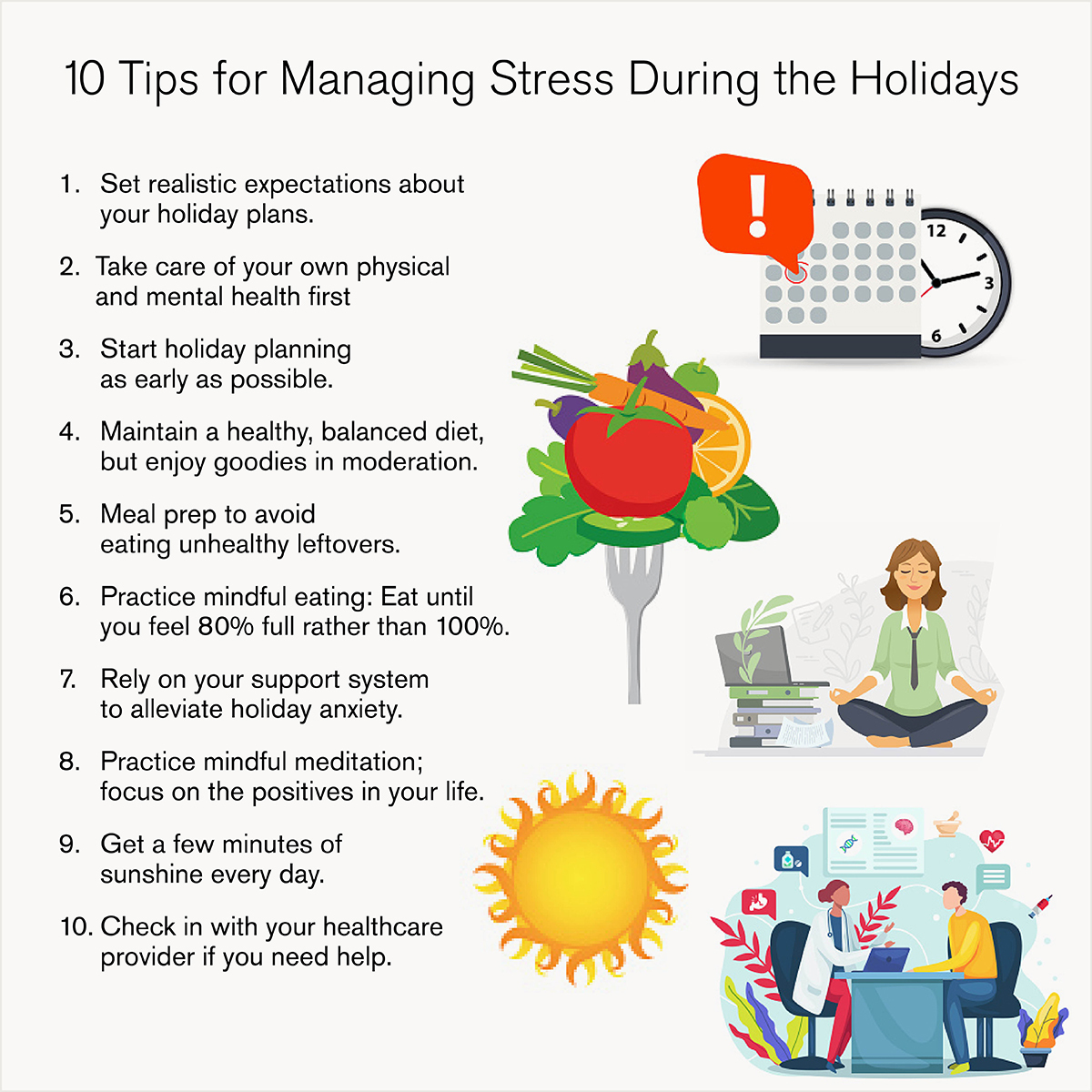While the holiday season can be a time of faith, family and fun, many people don't feel particularly cheery this time of year. The holidays can bring just as much stress as joy, but there are ways to manage that stress during this festive time.
To help make this a season of relaxation, we spoke with Dr. Peter Andruszkiewicz, a primary care provider at Loyola Medicine, to learn how to decrease stress in order to make the holidays a little brighter.
"Many people feel burnout during this time. They're trying to purchase gifts, host parties, and make everyone else happy without thinking of themselves. Thankfully, it doesn't have to be this way," says Dr. Andruszkiewicz.
Common stressors during the holidays
Despite our differing customs and traditions during the holidays, many people experience similar stressors. Perhaps it is feeling overwhelmed about hosting Thanksgiving, Christmas or Hanukkah. Or the frustration of not being able to buy the present you wanted to give a loved one. Or, it's any combination of concerns over a number of different scenarios.
Some of the most common stressors include:
- Worrying about disappointing friends and family by purchasing the wrong gifts.
- Being a good host for the holidays.
- Coping with grief if a family member or friend is no longer with you.
- Traveling to see family and friends.
- Making time for faith services among other priorities.
Thankfully, many of these stressors can be alleviated by doing one thing; setting realistic expectations.
"It's important for people to set realistic expectations as far as what kind of gifts to give, the type of food to prepare, and when it's safe to travel, among other things," says Dr. Andruszkiewicz. "And don't forget to take care of yourself first. You can't make the holidays a special time if you aren't making sure your health, physical and mental, is strong."
Start planning ahead, as early as possible, to help with managing holiday stress. For example, if you're traveling, check the weather frequently a week before, the day before, and the day of, so plans can be changed if needed.
When you feel in control of the holidays, you can control your stress.

How does holiday nutrition affect stress?
For many people, a healthy diet becomes less of a priority during the holidays. That's not necessarily a bad thing. After all, the holidays wouldn't be very fun if you couldn't enjoy the delicious food. However, eating healthy during the holidays does play a part in stress levels and should be considered.
A balanced diet supports a healthy immune system, provides necessary energy during stressful events, and some minerals actually regulate cortisol levels. One study found that vegetables and other foods with polyunsaturated fats, including omega-3 fatty acids, helped control stress levels.
"Outside of the main holiday meals, you can meal prep to avoid eating out or eating unhealthy leftovers. Of course, this may not be possible during the busy holidays," says Dr. Andruszkiewicz. "If you don't have time to meal prep, try to eat at least one kind of fruit or vegetable every day, whether that's a carrot, broccoli, etc."
One simple trick you can incorporate into your holiday plans is eating slowly. It's easy to eat a lot of food during the holidays, but when you eat slowly, your brain has time to recognize the capacity of your stomach. This allows you to notice when you're starting to become full and stop eating rather than suddenly feeling extremely full and tired.
A good rule of thumb is to eat until you feel 80% full rather than 100%. Practicing mindful eating during the holidays can go a long way.
Create a support system to help holiday mental health
If you experience a lot of stress and holiday anxiety, it isn't something you have to handle alone. Whether you're coping with grief over a lost loved one or are overwhelmed by what you need to get done, a support system of family, friends, and/or professional counselors can be helpful in dealing with holiday anxiety.
"For people who are grieving or feeling stress, you should acknowledge that feeling, accept it, be willing to share it with someone you know, and, potentially, seek professional help," says Dr. Andruszkiewicz. "If you need to talk to someone professionally, there are behavioral health specialists and counselors that are available during the holidays."
If you are already speaking with a professional, continue seeing them throughout the holidays. Don't skip your appointments just because it's a busy time of the year.
Some other tips that may help include:
- Practicing mindful meditation. Take a few minutes every day by yourself and simply sit with your thoughts, reflecting on your life, and the positives.
- Get sunlight. This time of the year, people wake up when it's dark and leave work when it's dark. Make sure to step outside and get a few minutes of sunshine every day. This can also help with fighting seasonal depression.
Speak with your Loyola Medicine primary care doctor
Your primary care doctor at Loyola Medicine is your partner in health for life. If you're feeling stressed during the holidays, need a referral to a behavioral health specialist, or simply want a health check-up before the year is over, make an appointment.
Loyola’s board-certified primary care physicians provide annual physical exams, recommendations for disease prevention, diagnosis of illness, referrals to specialists and patient education. With more than 20 primary care clinics throughout the Chicago area, our physicians and advanced practice nurses provide expert care for you and the entire family.
To make an appointment, call 888-584-7888 or schedule an appointment online.
Book an appointment today to see a Loyola physician by self-scheduling an in-person or virtual appointment using myLoyola.

